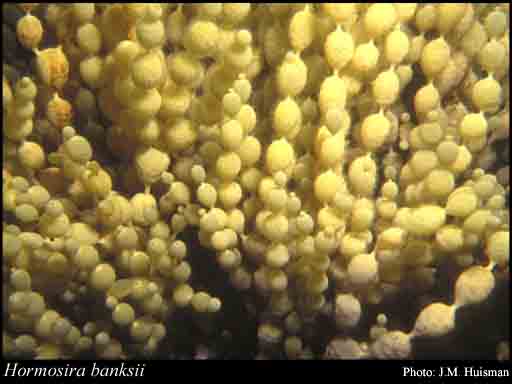- Reference
- Ann.Sci.Nat., Bot. 331 (1842)
- Conservation Code
- Not threatened
- Naturalised Status
- Native to Western Australia
- Name Status
- Current

Scientific Description
Habit and structure. Thallus medium to dark brown, (5–)10–30 cm long, with one to several fronds from a thin, discoid, holdfast 3–10 mm across, epilithic or occasionally free floating. Fronds simple to several times subdi- or polychotomously branched at close to distant intervals, formed of a series of moniliform vesicular segments, slender near the base, mostly 5–15(–30) mm in diameter, varying from elongate-ovoid to subspherical depending on the variety, connected by narrow internodes 1–5 mm long and 1–2 mm thick, becoming slightly verrucose as conceptacles develop. Growth from a group of 4 adjacent apical cells, each three-sided in transverse section, in an apical groove. Structure of hollow segments with an inner, filamentous, reticulate, medulla, a parenchymatous cortex and outer meristoderm.
Reproduction. Thalli dioecious. Conceptacles scattered over the segments, largely within the cortex, with sex organs, simple paraphyses, and phaeophycean hairs within the ostiole. Female conceptacles with sessile, obovoid to clavate, oogonia, 120–160 µm long and 40–80 µm in diameter, forming 4 eggs. Male conceptacles with antheridia on branched paraphyses, elongate-ovoid, 30–40(–45) µm long and 7–14 µm in diam.
Distribution.From Walpole, W. Aust., around southern Australia and Tas., to Port Macquarie, N.S.W., Lord Howe I., Norfolk I.
[After Womersley, Mar. Benthic Fl. Southern Australia II: 341–342 (1987)]
Distribution
- IBRA Regions
- Esperance Plains, Jarrah Forest, Mallee, Warren.
- IBRA Subregions
- Eastern Mallee, Fitzgerald, Recherche, Southern Jarrah Forest, Warren.
- IMCRA Regions
- WA South Coast.
- Local Government Areas (LGAs)
- Albany, Esperance, Jerramungup, Ravensthorpe.